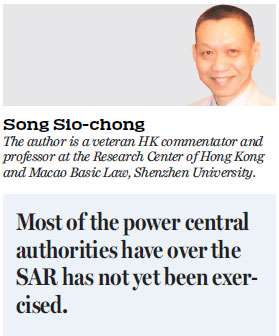Central authorities reign over and govern Hong Kong
Updated: 2017-07-10 07:39
By Song Sio-chong(HK Edition)
|
|||||||||
In the United Kingdom, the queen reigns and does not govern. This is virtually true. Unfortunately, some people have misapplied this analogy to Hong Kong under "one country, two systems" and say the central authorities may reign but not govern Hong Kong.
With limited knowledge and understanding, they have even claimed of having a sound base, citing Article 22(1) of the Basic Law which states: "No departments of the central government and no province, autonomous region, or municipality directly under the central government may interfere in the affairs which the Hong Kong Special Administrative Region administers on its own in accordance with this Law." But this restriction on certain government departments at national level and provincial governments' interference in the autonomy of the HKSAR cannot be construed unduly.
The phrase "departments of the central government" should not be confused with the central government (State Council). The former refers to various ministries and committees of the central government such as Education Ministry, National Development and Reform Commission, etc but not the central government itself, or the central authorities mentioned in Chapter II of the Basic Law - "Relationship between the Central Authorities and the HKSAR".

Exceptions are also allowed. Article 13(1) and 14(1) of this law declares acceptance of responsibility of the central government for foreign affairs relating to and defense of the SAR. It is further provided that the Ministry of Foreign Affairs shall establish an office in Hong Kong to deal with foreign affairs (Article 13(2)). Without interfering with local affairs of the SAR, military forces shall be stationed by the central government in Hong Kong for defense (Article 14(3)).
Not only shall the central government be responsible for foreign affairs and the defense of the SAR, Article 45(1) of this law requires appointment of the chief executive by the central government subsequent to selection by election or through consultation held locally. Article 48(5) provides that, after nomination by the chief executive, all principal officials of the regional government shall be appointed by the central government as well. Those appointments are all substantial as opposed to virtual appointment of the prime minister and cabinet members by the queen in the UK.
Also Article 48(3) of this law demands the chief executive submit the SAR's budgets and final accounts to the central government for the record, to be supervised by the latter. Vetting budgets and final accounts is within the meaning of regional autonomy; this is an example of the central government looking into affairs of regional autonomy, contrary to the claim that the central government only reigns over but not governs Hong Kong.
Under Article 48(8) of the Basic Law, the chief executive is required: "To implement the directives issued by the Central Government in respect of the relevant matters provided for in this Law."
Pursuant to Articles 17, 18 and 158 of this law, all regional matters can be classified into three: affairs within the responsibility of the central authority, affairs regarding the relationship between the central authorities and the SAR, and affairs of autonomy. Irrespective of their nature, the central government may issue "directives" to the chief executive for implementation so long as the relevant affairs have been provided for in this law.
As the central government and the central authorities may sometimes be mixed up, clarification is necessary. The central government refers to the State Council under the leadership of the premier whereas there are five central authorities, who may exercise functions and powers upon Hong Kong under "one country, two systems", including the National People's Congress (NPC), NPC Standing Committee (NPCSC), the president of the People's Republic of China and the Central Military Commission, in addition to the central government.
Aside from the above-mentioned functions and power of the central authorities the NPCSC also has other powers such as the following:
The NPCSC may supervise any local legislation submitted for record by returning such legislation if it does not conform with provisions of the Basic Law regarding affairs within the responsibility of central government authorities or regarding the relationship between the central authorities and the SAR (Article 17(3)). If it is violating provisions of this law regarding affairs of regional autonomy, the NPCSC's legislative interpretation may if necessary be furnished.
Besides supervision of high-ranking judges - by report for the record by the chief executive to the NPCSC for the appointment and removal of the highest judges in the SAR (Article 90(2)), the Basic Law has also adopted functional separation between final adjudication and final interpretation of this law. Adjudication power is vested in the Court of Final Appeal (Article 82), while the interpretation power is vested in the NPCSC (Article 158(1)). That is to say, respecting the interpretation of the Basic Law, legislative interpretation by the NPCSC prevails to ensure common understanding of this law in the whole nation.
To be fair, central authorities may not only reign but also govern the SAR according to the Constitution and Basic Law but most of the power central authorities have over the SAR has not yet been exercised.
(HK Edition 07/10/2017 page8)